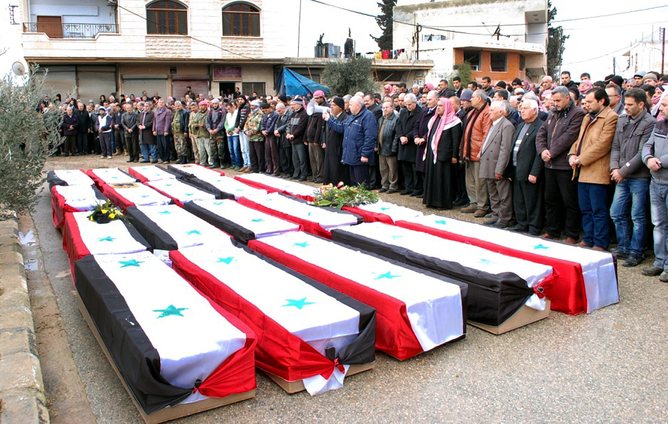IN THE MEDIA
Want peace in Syria? Work on reconciliation from day one
January 15, 2014 | Or Avi Guy

Or Avi-Guy
When outsiders survey the devastation in Syria, reconciliation is probably the last thing that comes to mind. Millions of refugees and internally displaced people are desperate for humanitarian aid. Millions more are caught in the lines of sectarian fire. Who has time to think about such fluffy “feel-good” concepts?
Yet with the Peace Conference for Syria scheduled to take place in Geneva this month, the thorny issue of post-conflict reconciliation must not be ignored. If national reconstruction is to deliver long-term stability and societal well-being, “reconciliation” is not simply an academic concept but an indispensable goal.
United Nations Secretary-General Ban Ki-Moon announced the peace conference as the General Assembly’s 68th session was being wrapped up. The best way to describe the discussion on Syria during the session is “blink and you’ll miss it”. It was mentioned only in the Third Committee proceedings (dealing with social, humanitarian and cultural issues) and only one resolution on Syria was passed.
Still, the document is worth a close read. Possibly its most important elements express the UN’s vision for conflict resolution. Towards the very end of the resolution, the General Assembly:
…stresses that rapid progress on a political transition represents the best opportunity to resolve the situation in the Syrian Arab Republic peacefully.
The resolution then calls for an international conference to promote such transition.
But will a political transition be enough? In such a deeply sectarian conflict, it is crucial that reconciliation between Syria’s various communities be emphasised from the start. This must not be postponed to after the conflict or put in the “too hard basket”.
Political transition has been a key element in many peace processes attempting to resolve sectarian and ethnic conflicts. Often the final accords establish a new political system, based on power sharing and similar constitutional balancing acts. Yet time and time again history has proven that these models, on their own, are hardly sufficient in dealing with the legacy of violence.
Without a coherent reconciliation policy, arrangements aimed at group-based representation can perpetuate ethnic cleavages. Division is entrenched as the most prominent element of the new, post-conflict system. The transition is then usually not from civil war to political stability, but something more like from civil war to political war.
Look at Bosnia, Northern Ireland or, most pertinently, Syria’s next-door neighbour, Lebanon. Despite political agreements that officially “resolved” their internal conflicts in the 1990s, sectarianism still has severe detrimental influences. It diminishes the efficiency of state institutions, prevents the development of a common political culture and creates a constant undercurrent of social tensions.
The UN General Assembly does recognise this need for reconciliation when its resolution:
…underlines the importance that the Syrian people, on the basis of broad, inclusive and credible consultations, should determine … the domestic process and mechanism to achieve reconciliation, truth and accountability for gross violations, as well as reparations and effective remedies for the victims.
This is correct as far as it goes. Ending impunity and making genuine and comprehensive efforts to document truth and provide a measure of justice for victims are crucial. Countries emerging from conflict must deal with the ongoing effects of the traumas suffered by large segments of the population.
The government of Syria has, until now, failed to protect its population. It has often been the perpetrator of violence and atrocities directed against civilians. The UN resolution is by no means exaggerating when it suggests that some of the atrocities “may amount to crimes against humanity”.
The serious human rights violations mentioned include large-scale use of chemical weapons – including against civilians – attacks on schools, hospitals and places of worship, massacres, arbitrary executions, extrajudicial killings, enforced disappearances, torture, sexual and gender-based violence, rape in detention and abuse of children – such as recruitment, killing and maiming. The list goes on and on.
The death toll exceeds 100,000. Millions of refugees and internally displaced persons are living in harsh, and still deteriorating, conditions.
Unsurprisingly, the Assad regime is also failing to prosecute human rights violations. It has even blocked humanitarian assistance to civilians, especially in rebel-controlled areas.
On the other side of the conflict, extremist groups have largely taken over. Interventions by foreign combatants – notably Hezbollah and Iranian forces on the government side, and al-Qaeda-linked groups in Iraq and elsewhere on the rebel side – have inflamed the situation. They too lack commitment to even basic human rights and their presence makes internal reconciliation among Syrians more difficult.
Post-conflict governments often avoid these issues as being too divisive, painful and sensitive. This is especially the case when peace negotiations result in ethnically based power-sharing arrangements. Anti-sectarianism then has no political constituency or capital, since group identity becomes the main feature of political representation in a system dominated by ethnicity-based voting patterns.
Regardless of the different ways in which political transition might take place, leaving reconciliation out of the peacemaking framework runs the risk of dooming Syria to perpetual sectarianism. The UN General Assembly seems to have acknowledged that.
The international community needs to follow this up in Geneva and avoid the temptation to pursue the diplomatic path of least resistance. Backing a sectarian solution may appear to promise at least an end to the immediate bloodshed but would, at best, likely just postpone future conflict.
Or Avi-Guy is a PhD candidate in the School of Social and Political Science at the University of Melbourne, and a policy analyst for Australia/Israel and Jewish Affairs Council.
Tags:





